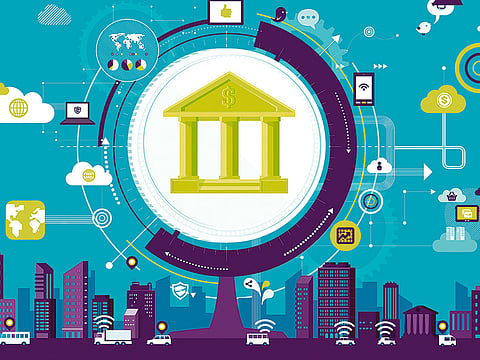Banking on the internet of things
As the number of connected devices increases, financial institutions will play a deeper role in the life of their customers

Picture the scene: your car flashes a dashboard alert while you are on your way home that an engine repair is necessary. While calculating how to pay for a large, unexpected expense, an alert from your bank pops up on your smartphone. The car’s onboard computer has alerted the vehicle status to your bank, and it provides two mechanics’ quotes and available appointment times. The bank also suggests you finance the repair by reducing vacation savings for six months.
It sounds like science fiction, but digitally connected customers can expect banks to start playing a deeper role in their lives. Going beyond their traditional function — mainly as facilitators of financial transactions — banks will start positioning themselves at the centre of an extended ecosystem that offers consumers benefits beyond banking.
The internet of things (IoT) creates unprecedented opportunities for financial firms to deliver tailored products and services based on real-time information.
Your everyday bank
Consultancy firm Accenture has coined a nifty term for this concept: the Everyday Bank. “In a digital world, winning and retaining customers hinge on creating value for them that enhances the convenience and quality of their everyday lives beyond mere transactions,” the firm explains in a 2014 report called The Everyday Bank — A New Vision for the Digital Age.
Powered by a vast flow of data, banks will anticipate customer needs, respond to changing circumstances, and offer timely, targeted solutions. According to technology consulting firm Gartner, about 6.4 billion devices, from household appliances to heavy machinery, are connected to the internet today. And in the next four years the number is forecast to go up to 21 billion.
By accessing the data captured by smart devices of all kinds, banks will provide customers with a holistic, real-time updated view of their personal finances. The report says US-based auto insurers Progressive and Travelers have taken the lead in using telematics devices to monitor customers’ actual driving behaviours and adjusting their premiums accordingly.
Mobile penetration and usage in the UAE is among the highest in the world, making it a fertile ground for new trends. The country has the highest per capita mobile phone penetration in the Middle East and North Africa, with an estimated 80.6 per cent of the population owning a mobile phone, according to eMarketer’s 2015 Global Media Intelligence Report. This figure is expected to climb to 82.8 per cent by 2019. According to another report by professional services firm EY, which conducted a large-scale field survey of retail customers in GCC countries between June and August 2015, “smartphones are a way of life for the dominant majority of smartphone customers”, with 88 per cent using email, 82 per cent using social media and 72 per cent using instant messaging daily on their smartphones.
All-round support
The UAE’s Smart City initiatives will only encourage increased mobile and digital connectivity as transport, economy, government and environment become ever more seamlessly linked.
There is evidence that banks in the UAE are developing an Everyday Bank strategy. Mashreq, the largest private sector bank in the country, is developing and improving its digital channels.
Today more than 51 per cent of all Mashreq customers use mobile banking, says Aref Al Ramli, Head of Digital Banking at Mashreq. The bank is also the first in the UAE to allow transfers and deposits using Emirates ID. “What’s dictating the banks to change is customer behaviour,” Al Ramli says. “Customers today are connected more than ever and their life revolves entirely around their mobile device and connectivity to the internet.”
To become an Everyday Bank, it is not enough to merely introduce more digital channels though that is a start. “Simply being more digital — creating upgraded, digital or mobile friendly versions of existing products and services — will not be enough,” the Accenture report says. “Besides financial transactions, a bank can help customers with advice, access and the information they need to make decisions.”
Mining data
For example, Spanish bank BBVA’s acquisition of Simple, a digital US bank, allowed it to develop a new generation of personal financial management tools, according to Accenture. The bank records more than 80 transaction features every time a customer uses a debit card. It uses this data to help customers analyse spending and manage their money.
Closer to home, Garanti, Turkey’s second-largest bank, has developed an app that reflects “a paradigm shift in mobile banking”, says Accenture. The iGarnati app offers users a suite of products that allow them to easily make mobile payments as well as access personal financial management tools, location-based discounts, and a lengthy menu of customisations to the basic mobile banking app.
The app analyses transaction data to suggest potential savings to users, keeps an eye on how much they have in their current accounts to last them the month, and offers impulse savings tools.
Garanti’s initiative is delivering results. The app registered 150,000 downloads and 100,000 active users within its first six months, according to Forrester Research data cited by Accenture. Crucially, it also brought in $30 million (Dh110 million) in deposits from savings products available through the app.



